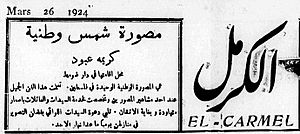Al-Karmil (newspaper) facts for kids
| Type | Weekly newspaper |
|---|---|
| Owner(s) | Najib Nassar |
| Founded | 1908 |
| Political alignment | anti-Zionist |
| Ceased publication | approx. 1944 |
| Headquarters | Haifa |
Al-Karmil or El-Carmel (Arabic: الكرمل) was an Arabic-language newspaper. It was published twice a week. The newspaper started in December 1908. This was near the end of the Ottoman Empire's rule in Palestine.
The newspaper was named after Mount Carmel in the Haifa area. Its main goal was to "oppose Zionist settlement." This meant it was against the movement to create a Jewish homeland in Palestine.
Najib Nassar was the owner, editor, and main writer for Al-Karmil. He was a Palestinian Arab Christian. He strongly opposed Zionism. His articles often warned about the challenges Zionism could bring to the Palestinian people. Other newspapers in the Syrian region often reprinted his writings.
From the 1920s, Najib's wife, Sadhij Nassar, also played a big role. She was a key editor, manager, and journalist. Besides writing, she translated articles from foreign newspapers. She became the editor from 1941 to 1944. After that, the British rulers did not give her a permit to continue.
After World War I, the Ottoman Empire ended. Al-Karmil kept being published. It continued during the British rule in Palestine until the 1940s.
Contents
What the Newspaper Wrote About
Opposing Zionism
Al-Karmil and another early Palestinian newspaper, Filastin, were very important. They helped shape a sense of identity for the Palestinian people. They also encouraged opposition to Zionism. Historian Rashid Khalidi said that Al-Karmil quickly became the main way to speak out against Zionist settlement in Palestine.
Najib Nassar, the paper's owner and editor, did more than just print news. He also published articles about Zionism from other Arabic newspapers. These papers were from cities like Cairo, Beirut, and Damascus. He also covered the activities of Zionist groups in Palestine and other countries.
Between March and June 1911, Al-Karmil published a long series. It was called "Zionism: Its history, objective, and importance." This series was later made into a 65-page booklet. It included parts of an article on Zionism from the Encyclopedia Judaica. Nassar also added his own thoughts.
The booklet ended by talking about Theodor Herzl, a key figure in Zionism. Nassar called for people like Herzl to come forward from the Palestinian population. He wanted them to forget their own interests and work for the public good to oppose Zionism. Nassar wanted to make people aware of Zionism's goals. He saw them as a challenge to the Arab way of life in Palestine. He also pointed out times when Ottoman and later British rulers seemed to be helping Zionists buy land.
When World War I started in 1914, Najib Nassar spoke against Turkey joining the war. He was then put on a wanted list. He was accused of spying for the British against the Ottoman Empire and its German allies. He had to leave his home in Haifa. He traveled across the Galilee and the eastern bank of the River Jordan. He was on the run for three years. He lived with Bedouin goat herders in the hills. He often barely escaped being caught.
Standing Up for Women's Rights

In 1926, Al-Karmil started a "women's page." Sadhij Nassar, Najib Nassar's wife, edited this section. She also worked as an editor and managed the newspaper. Between 1926 and 1933, she wrote about many topics. These included women's activities locally, regionally, and internationally.
Sadhij Nassar encouraged women to raise their sons and daughters equally. She also urged them to work to become financially independent. She wanted women to get involved in politics. She asked them to work together instead of being divided. For example, in the late 1920s, she wrote: "You are responsible. Yes, you Palestinian Arab ladies, Muslim and Christian, you are responsible for the integrity of the nation and keeping Palestine Arab as it was until now. Every woman will spread the spirit of cooperation among the sons of the Arabs in the souls of her children."
In 1930, Sadhij Nassar helped start the Arab Women's Union in Haifa. She also became its secretary. This group was one of the more active women's movements during the British Mandate period.
Relationship with the Rulers
Ottoman Rule
In its early years, Al-Karmil had a positive view of the ruling Ottoman authorities. This was the Turkish Committee of Union and Progress (CUP). But by 1911, the newspaper changed its view. Like many other pan-Arabist thinkers, it began to oppose the CUP. This was because they felt the CUP favored Zionism. Many writers for Al-Karmil had taken part in the Arab revolt of 1916. These included Druze thinker Ali Nasir al-Din and journalist Hamdi al-Husayni.
British Mandate Rule
In the late 1930s, the British authorities described Sadhij Nassar as a "threat to public safety." They called her a "leading activist." She was arrested in March 1939 by British police. She was held in a women's prison in Bethlehem until February 1940. She was held because she was "actively engaged in spreading ideas against the government."
After her release, she went back to editing Al-Karmil. She was the editor between 1941 and 1944. During this time, the newspaper was running without a permit. The British authorities had refused to give them one. She continued her work in the women's movement until 1948. After that, she became a refugee. She wrote for different publications in London and Damascus. In Damascus, she tried to open a branch of the Arab Women's Union. It is believed she passed away in Damascus during the 1970s.
Images for kids
-
Karimeh Abbud advertising her photography business in Al-Karmil in 1924
 | James Van Der Zee |
 | Alma Thomas |
 | Ellis Wilson |
 | Margaret Taylor-Burroughs |


